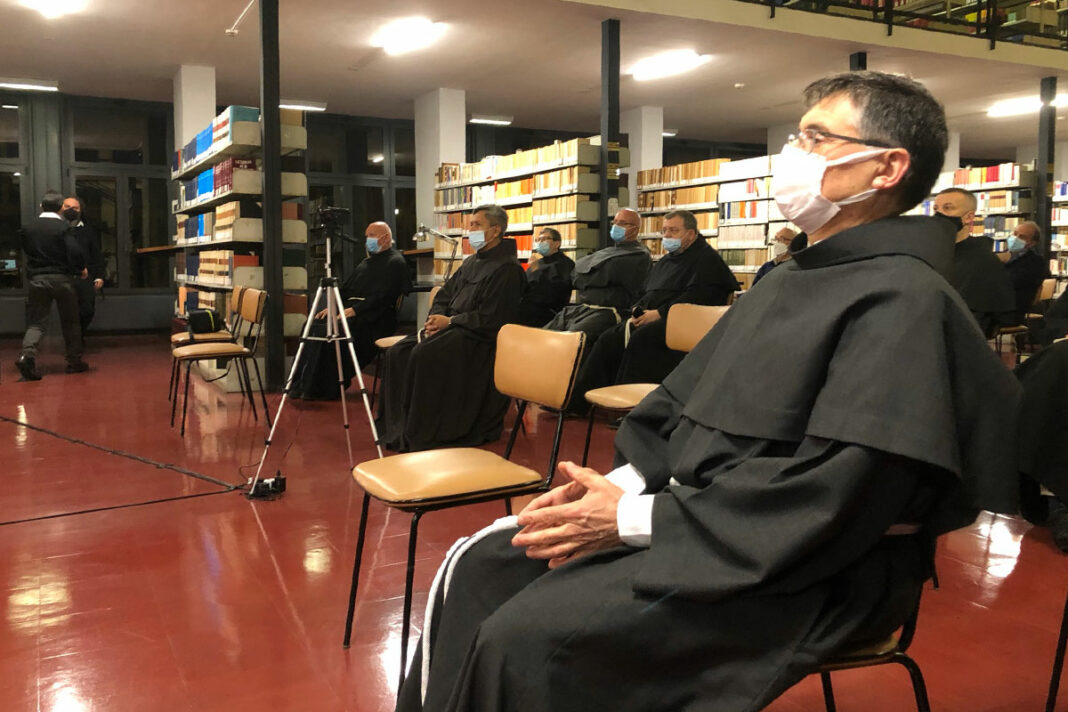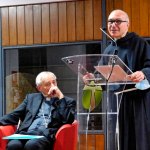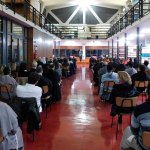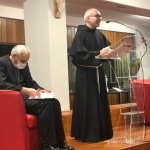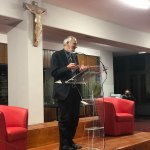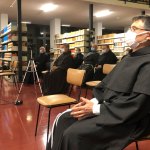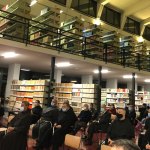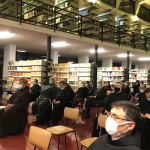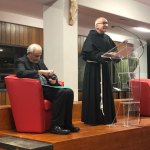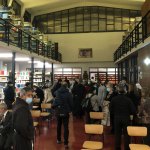On Wednesday November 10, 2021, an inauguration ceremony took place for the 118th academic year of the Pontifical Theological Faculty of St. Bonaventure (Seraphicum). The event was held in the library of the Faculty.
The Dean, Friar Raffaele DI MURO, opened the ceremony by greeting and thanking all those present. In particular he acknowledged the Grand Chancellor of the Faculty and Minister General, Friar Carlos TROVARELLI; the Rector of the Pontifical Antonianum University, Friar Agustín HERNÁNDEZ; the Rector of the Pontifical University Regina Apostolorum, Father José E. OYARZÚN; and His Eminence, Matteo Cardinal ZUPPI, Archbishop of Bologna. Cardinal ZUPPI gave an academic lecture on Fratelli tutti, Pope Francis’ encyclical on fraternity and social friendship. Fratelli tutti is also the subject of a higher education course that the Faculty is introducing this academic year.
During the lecture, Pope Francis’ dream for universal fraternity emerged, a dream made evident from his first words on the day of his election. This dream does not arise from a utopian impulse, but from a full awareness of a world that is the victim of multiple pandemics and a real change of epoch, to which the Catholic Church can and must give an answer. The answer does not originate with Pope Francis. It finds its roots in the apostolic tradition, actualized by the Second Vatican Council and subsequent pontificates. The Church must respond by building internal and external bridges of fraternity. Fraternity has been an essential attribute of the Christian experience from the beginning. It was further developed thanks to the Franciscan experience. It is the great failed promise of modernity, in that the choice for individualism has undermined freedom and equality, even where they seemed to have been established. Fratelli tutti is therefore the basic primer needed to find a common language; it is a document that, originating in the Second Vatican Council, has as its icon the Spirit of Assisi. In 1986, the Spirit of Assisi enabled St. John Paul II to become a promoter of a real interreligious dialogue. Dialogue is the opposite of syncretism, because—as Cardinal ZUPPI pointed out—dialogue “asks you to explain who you are.” Cardinal ZUPPI gave a quick analysis on how the collapse of ideologies and the development of an individualism incapable of generating happiness have formed a sterile generation that has consumed everything “even dreams.” He stressed that no one saves himself alone and that Fratelli tutti is not some dream developed in a laboratory; it is a “daydream that is spiritual and concrete at the same time.” Fratelli tutti is not a simple document of socio-political instructions for international coexistence; it is a way of looking at the world with an extremely realistic viewpoint, starting precisely from the Christian identity—because the “I” does not find itself by closing itself off, but in relation to the other; because love for one’s neighbor is realistic; because conquering the individualism that emphasizes the “I” is achieved by showing how the “I” reaches its maximum in the encounter with the other, in universal fraternity. The universal is not opposed to the local, because to the Christian, no one is an enemy. An example of this is found in the story of Francis’ encounter with the wolf of Gubbio. Here, the perpetrator of violence and the victim, by means of mutual dialogue, arrive the cause underlying the perpetrators’ violent actions—hunger. This allowed Francis to start a new path of peace by removing that cause.
The Dean heartily thanked Cardinal ZUPPI for his lecture, which was not only based on his intellectual research but on his concrete life experience and made palpable by his words. The Dean dismissed those present and wished all the students and professors a very fruitful academic year.
Friar Roberto LIGGERI






